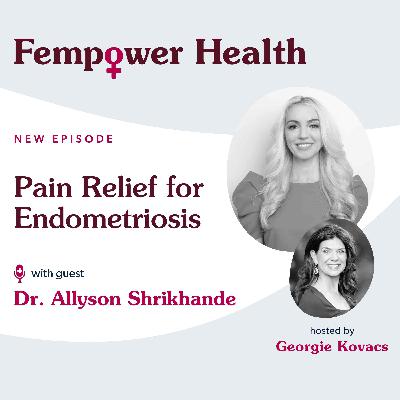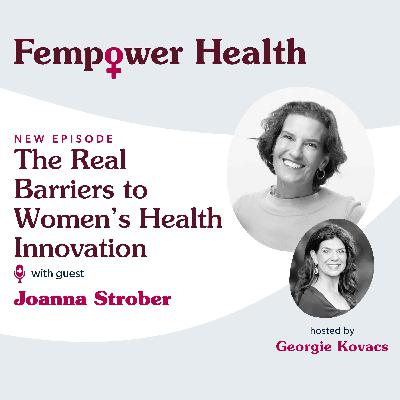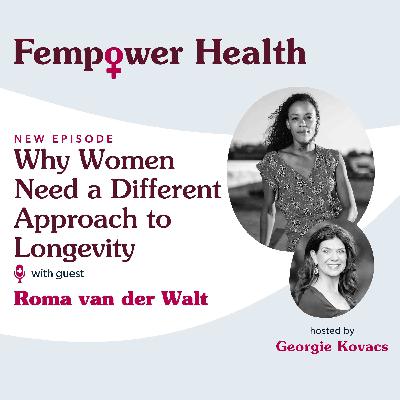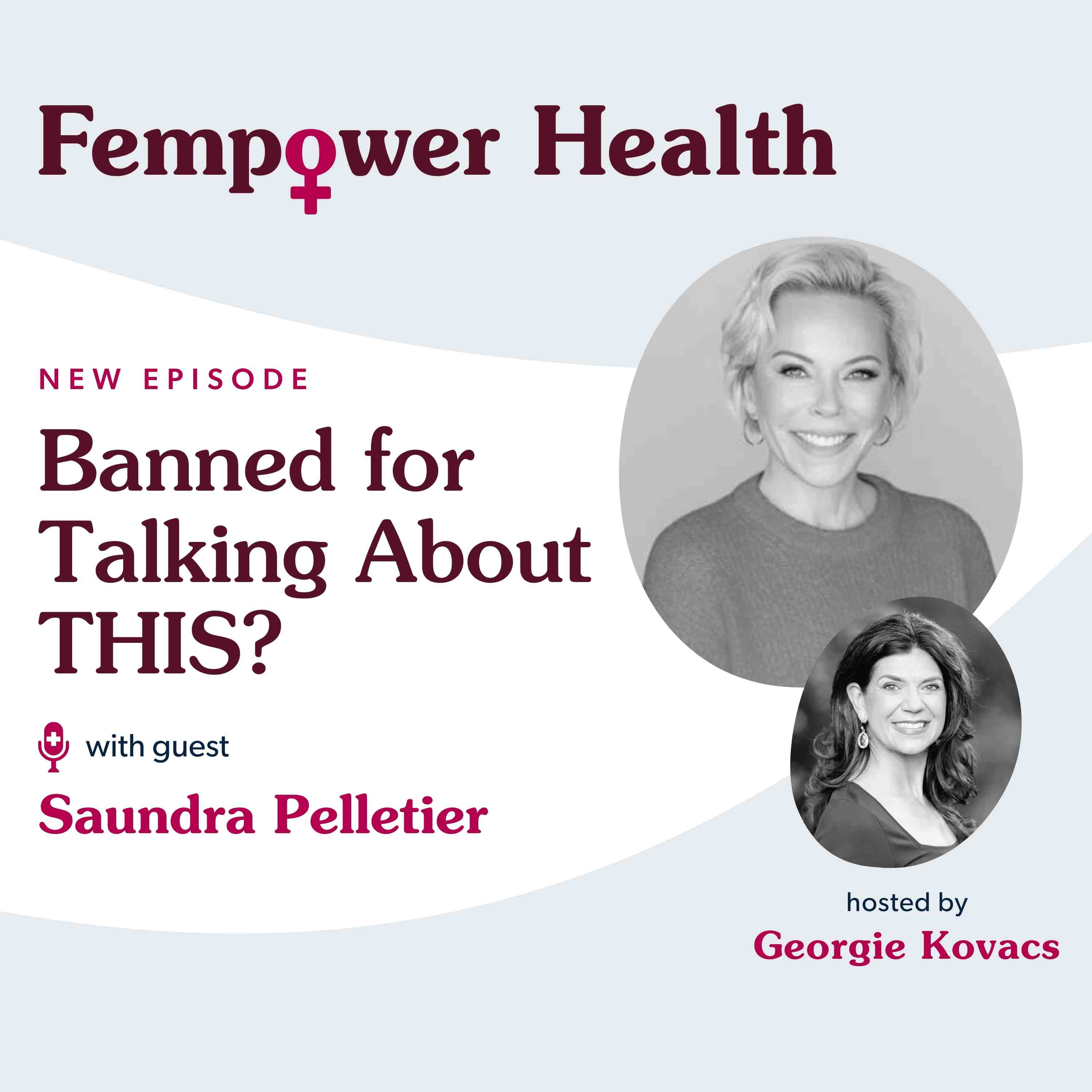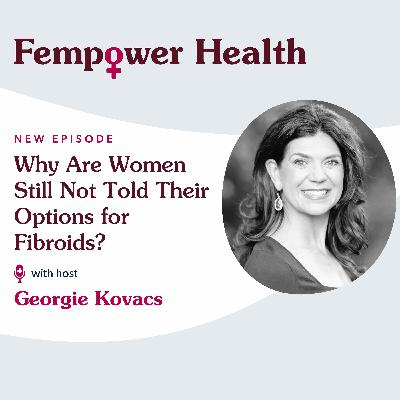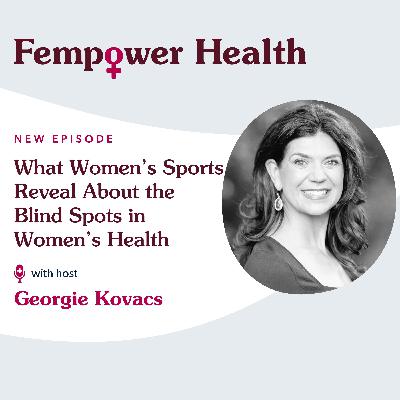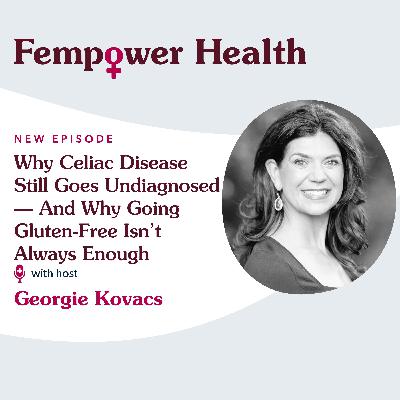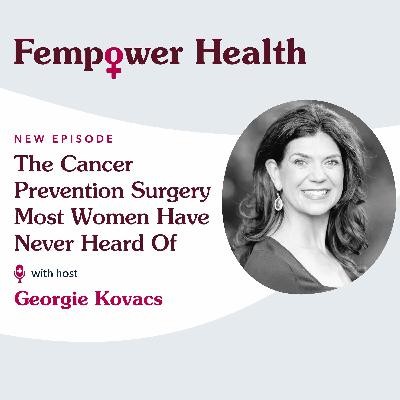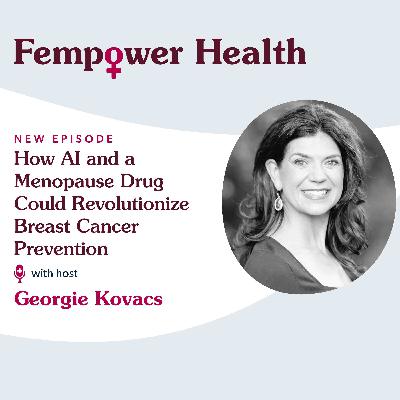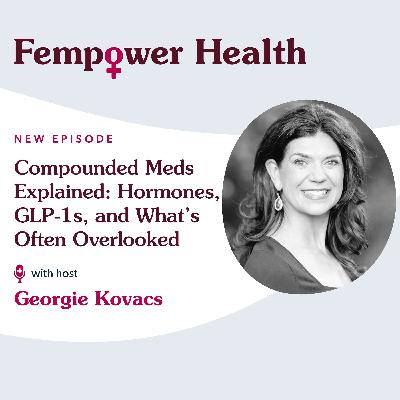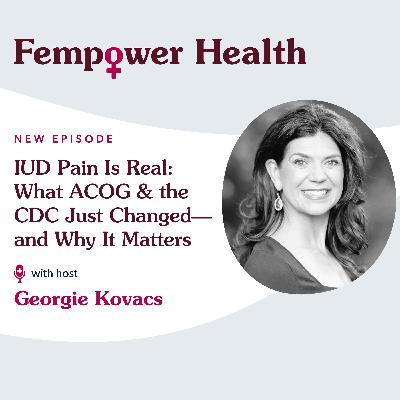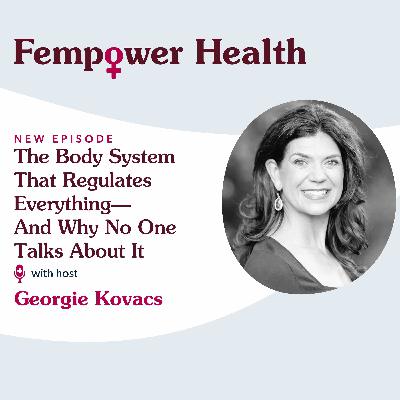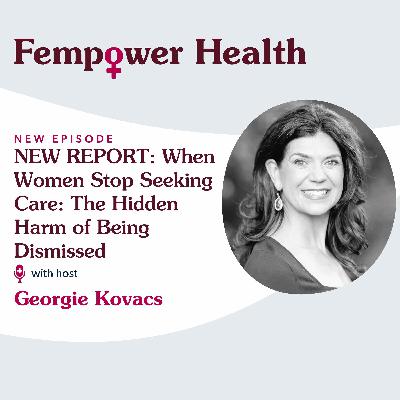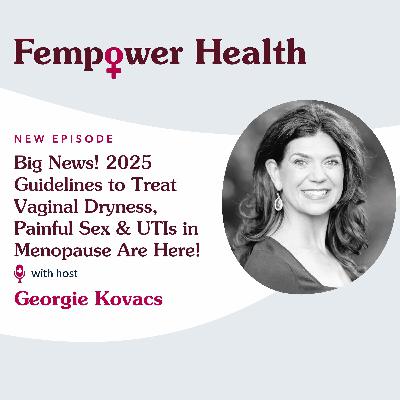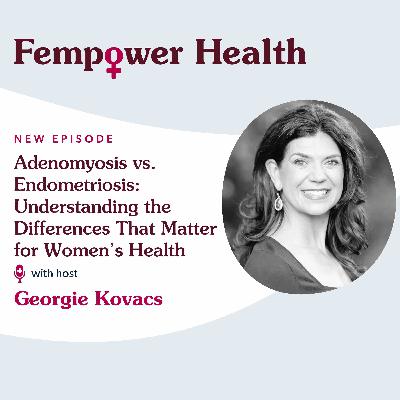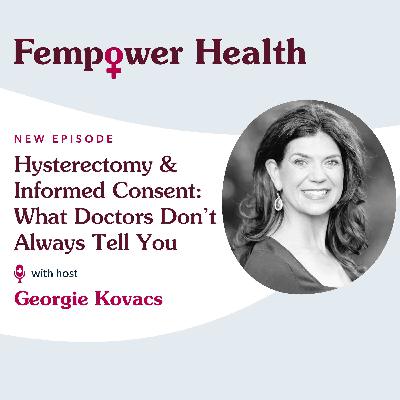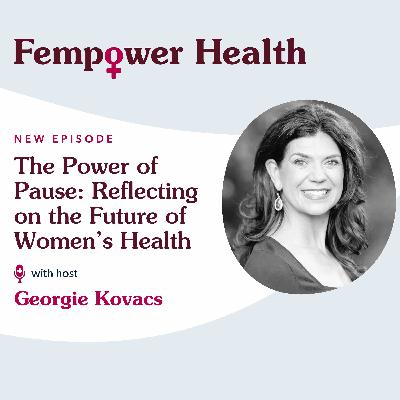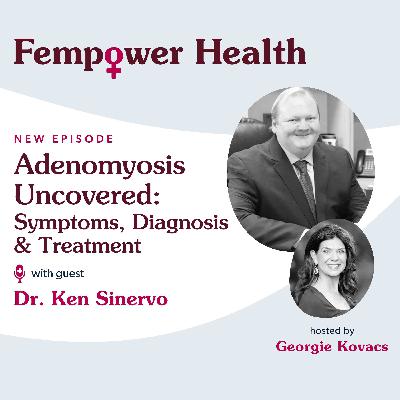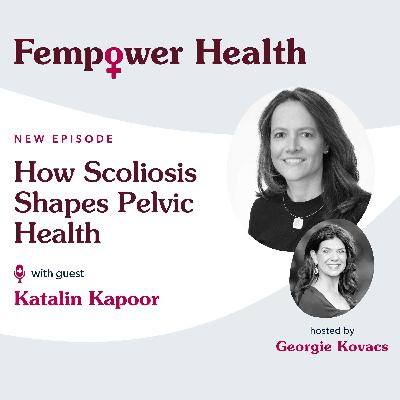Discover Fempower Health: The Chronic Pelvic Pain Channel
Fempower Health: The Chronic Pelvic Pain Channel

Fempower Health: The Chronic Pelvic Pain Channel
Author: Georgie Kovacs
Subscribed: 3Played: 32Subscribe
Share
© Copyright 2025 Georgie Kovacs
Description
Welcome to Fempower Health—where empowering women through every stage of life isn't just our mission; it's our passion.
Fempower Health is a beacon for women navigating the complex world of healthcare, providing a supportive platform where your voice is heard and your concerns are addressed with the compassion and understanding you deserve. Our podcast, a central hub for empowering information, is dedicated to women who find themselves on an exhausting quest for answers to their health questions and perhaps experience medical gaslighting. Fempower Health is here to light the way forward for those struggling with chronic pelvic pain.
Our content is meticulously designed with your needs in mind, focusing on essential women's health topics such as female reproductive health, managing menopause symptoms, autoimmune diseases, female cancers, endometriosis, and the journey of trying to conceive. We delve into often taboo topics like menstrual health, the complexities of perimenopause and menopause, and the critical balance of the gut and vaginal microbiome. Recognizing the holistic nature of health, we also cover women's mental health, pain management, pelvic health, Polycystic Ovarian Syndrome (PCOS), pregnancy and motherhood, thyroid disease, and female sexual health.
At Fempower Health, you'll gain access to world-renowned healthcare experts, including doctors, researchers, patient advocates, and women who share your struggles, providing a multifaceted perspective on health issues. We discuss not only the condition itself but also what is known versus unknown, empowering you with strategies to effectively communicate with your healthcare provider and guidance on finding the right specialists for your needs.
Beyond the podcast, Fempower Health extends its support through a rich array of women's health resources available on our website. Stay connected and informed through our social media channels and newsletter, where we continue to share health tips for women and the latest developments in women's healthcare.
Our founder, Georgie Kovacs, is a seasoned professional with over two decades of experience in the healthcare system, and brings a personal touch to Fempower Health. Having navigated her own health journey and advocated for her family through the intricacies of the healthcare system, she ensures that Fempower Health stands as a trustworthy and diligent advocate for women's health. This dedication is reflected in the rigorous vetting process for all guests, ensuring that you receive reliable, actionable information.
Join Fempower Health, the ultimate women's health podcast, as we explore, educate, and empower you to take control of your health journey. Here, we not only discuss what matters but also provide a path forward, breaking the silence on critical health issues and offering a community where you are seen, heard, and valued.
📣 Get the latest women's health news via the weekly newsletter: https://fempower-health-chronic-pelvic-pain.beehiiv.com/subscribe
📲 Stay Connected: Follow Fempower Health for more engaging content, expert interviews, and resources on women's health and wellness on
🌐 Website: https://www.fempower-health.com
🔅 Instagram: https://www.instagram.com/fempowerhealthpelvicpain
🔅 Facebook: https://www.facebook.com/fempowerhealthpelvicpain
🔅Twitter: https://www.twitter.com/pelvic_pain_hub
🔅TikTok: https://www.tiktok.com/fempowerhealthpelvicpain
Fempower Health is a beacon for women navigating the complex world of healthcare, providing a supportive platform where your voice is heard and your concerns are addressed with the compassion and understanding you deserve. Our podcast, a central hub for empowering information, is dedicated to women who find themselves on an exhausting quest for answers to their health questions and perhaps experience medical gaslighting. Fempower Health is here to light the way forward for those struggling with chronic pelvic pain.
Our content is meticulously designed with your needs in mind, focusing on essential women's health topics such as female reproductive health, managing menopause symptoms, autoimmune diseases, female cancers, endometriosis, and the journey of trying to conceive. We delve into often taboo topics like menstrual health, the complexities of perimenopause and menopause, and the critical balance of the gut and vaginal microbiome. Recognizing the holistic nature of health, we also cover women's mental health, pain management, pelvic health, Polycystic Ovarian Syndrome (PCOS), pregnancy and motherhood, thyroid disease, and female sexual health.
At Fempower Health, you'll gain access to world-renowned healthcare experts, including doctors, researchers, patient advocates, and women who share your struggles, providing a multifaceted perspective on health issues. We discuss not only the condition itself but also what is known versus unknown, empowering you with strategies to effectively communicate with your healthcare provider and guidance on finding the right specialists for your needs.
Beyond the podcast, Fempower Health extends its support through a rich array of women's health resources available on our website. Stay connected and informed through our social media channels and newsletter, where we continue to share health tips for women and the latest developments in women's healthcare.
Our founder, Georgie Kovacs, is a seasoned professional with over two decades of experience in the healthcare system, and brings a personal touch to Fempower Health. Having navigated her own health journey and advocated for her family through the intricacies of the healthcare system, she ensures that Fempower Health stands as a trustworthy and diligent advocate for women's health. This dedication is reflected in the rigorous vetting process for all guests, ensuring that you receive reliable, actionable information.
Join Fempower Health, the ultimate women's health podcast, as we explore, educate, and empower you to take control of your health journey. Here, we not only discuss what matters but also provide a path forward, breaking the silence on critical health issues and offering a community where you are seen, heard, and valued.
📣 Get the latest women's health news via the weekly newsletter: https://fempower-health-chronic-pelvic-pain.beehiiv.com/subscribe
📲 Stay Connected: Follow Fempower Health for more engaging content, expert interviews, and resources on women's health and wellness on
🌐 Website: https://www.fempower-health.com
🔅 Instagram: https://www.instagram.com/fempowerhealthpelvicpain
🔅 Facebook: https://www.facebook.com/fempowerhealthpelvicpain
🔅Twitter: https://www.twitter.com/pelvic_pain_hub
🔅TikTok: https://www.tiktok.com/fempowerhealthpelvicpain
64 Episodes
Reverse
Episode SummaryAI is everywhere — from apps on our phones to tools shaping clinical care. But what does it really mean for women’s health? Could AI finally close the health gap — or will it reinforce the same frustrations women already face in the doctor’s office?In this episode of Fempower Health, Georgie Kovacs sits down with Dr. Nikita Patel, a pharmacist, biomedical engineer, and healthcare innovation leader with 15 years of experience across biopharma, digital health, and AI. Nikita has held leadership roles including Director of Clinical Research & AI at Function Health, and she brings a multidisciplinary perspective on how data, diagnostics, and emerging technologies can transform health and human performance.Together, Georgie and Niki unpack what’s misunderstood about AI in healthcare, why women’s health needs its own data lens, and how clinicians and patients alike can use AI responsibly today.Discussion PointsWhat is AI in healthcare really doing behind the buzzword?Why is women’s health data missing — and how does this bias impact AI tools?How can women use AI to better advocate for themselves in doctor visits?Can AI improve clinical trials and drug development for women?What privacy risks should women and clinicians know about when using AI apps?How can healthcare providers evaluate whether an “AI-powered” tool is credible?What’s the future of personalized care — could digital twins and AI change everything?Who is responsible for setting standards for AI in women’s health?🎧 Loved the episode? Here's how you can take action:1. Help others discover Fempower Health:Leave a quick review on Apple or Spotify. It’s the easiest way to support our mission and amplify women’s health voices.2. Stay connected:Follow us on LinkedIn, Instagram and TikTok, YouTube for real-time updates, expert insights, and relatable conversations.Or join our newsletter to get curated women's health content—on your terms, in your inbox.**Top 50 Health Podcast of 2024** **The information shared by Fempower Health is not medical advice but for informational purposes to enable you to have more effective conversations with your doctor. Always talk to your doctor before making health-related decisions. Additionally, the views expressed by the Fempower Health podcast guests are their own and their appearance on the program does not imply an endorsement of them or any entity they represent.****May contain affiliate links and I will be compensated if you make a purchase after clicking on my links**
Originally Published May 2024. Re-sharing in honor of Chronic Pain Awareness MonthAre there ways to find pain relief for endometriosis? Listen as Dr. Allyson Shrikhande shares her expert insights on a whole-person approach to pain management. Episode SummaryIn this episode of Fempower Health, Georgie Kovacs hosts Dr. Allyson Shrikhande, a specialist in pelvic rehabilitation medicine. They explore the important topic of managing pelvic pain associated with endometriosis. Dr. Shrikhande discusses the complex symptoms and challenges of diagnosing endometriosis, which often go beyond typical menstrual discomfort and can even affect areas such as bladder function and sexual health. They discuss innovative, non-surgical approaches to pain management, incorporating targeted treatments and lifestyle modifications. Listen to gain insights into holistic, patient-centered methods that make significant relief possible for those battling chronic pelvic pain.Key Discussion Points:The diverse and often misunderstood symptoms of endometriosisEndometriosis’ impact on the menstrual cycle, bladder, bowel functions, and pain during intercourseNon-surgical methods for pelvic pain management when living with endometriosis Why detecting endometriosis early can change the course of treatment and potentially lessen the need for invasive proceduresNerve and muscle rehabilitation treatment options that provide relief without the complications associated with surgeryBenefits of a whole-person approach to managing endometriosis, which includes nutritional support, behavioral health, and physical therapyDr. Shrikhande emphasizes the need for greater awareness and education about endometriosis among both healthcare providers and patients"There are a lot of myths about pain management. It’s not just about pain relief; it’s about restoring function and managing the disease holistically." - Dr. Allyson ShrikhandeRelated to this episode:Resources on Pelvic HealthRead Beating EndoTry Your Pace YogaLearn more about Pelvic Rehabilitation Medicine and follow them on Instagram.Stay in touch with Dr Allyson Shrikhande and follow her on Instagram and LinkedIn.🎧 Loved the episode? Here's how you can take action:1. Help others discover Fempower Health:Leave a quick review on Apple or Spotify. It’s the easiest way to support our mission and amplify women’s health voices.2. Stay connected:Follow us on LinkedIn, Instagram and TikTok, YouTube for real-time updates, expert insights, and relatable conversations.Or join...
Episode SummaryWomen’s health faces systemic challenges that too often leave women without answers — especially in midlife, when care becomes fragmented and reimbursement models make solutions hard to scale.In this episode of Fempower Health, Georgie Kovacs speaks with Joanna Strober, CEO and co-founder of Midi Health and a seasoned entrepreneur who previously founded Kurbo Health (acquired by Weight Watchers). Joanna shares her journey from personal struggles with perimenopause symptoms to building solutions that confront the structural barriers in women’s health.Together, we explore why women are left to self-navigate, how venture capital and philanthropy are shaping the field, and what it will take to close the gap between research and real-world care.If you’re a woman seeking answers about your health, or a clinician striving to better serve your patients, this episode will give you a candid look at the truth: the system isn’t designed for women — but with insight and bold action, change is possible.Discussion PointsWhy do midlife women often “fall out” of the healthcare system?How do insurance and reimbursement barriers prevent women-centered care from scaling?Why does it take an average of 17 years for clinical evidence to become standard practice?How should innovators responsibly use emerging research in women’s health?What role did Pivotal Ventures and Wellcome Trust’s $100M commitment play — and why isn’t it enough?How do venture capital investors view women’s health innovation — is it bias, or a need to show scale?What cultural factors lead women to tolerate suffering instead of pushing for better care?Where does Joanna Strober see hope for the future of women’s health innovation?🎧 Loved the episode? Here's how you can take action:1. Help others discover Fempower Health:Leave a quick review on Apple or Spotify. It’s the easiest way to support our mission and amplify women’s health voices.2. Stay connected:Follow us on LinkedIn, Instagram and TikTok, YouTube for real-time updates, expert insights, and relatable conversations.Or join our newsletter to get curated women's health content—on your terms, in your inbox.**Top 50 Health Podcast of 2024** About Joanna StroberJoanna Strober is a visionary healthcare leader and CEO/co-founder of Midi Health,...
Longevity isn’t just about living longer — it’s about living better.In this episode of Fempower Health, host Georgie Kovacs sits down with Roma van der Walt, a sports scientist, women’s health strategist, and CEO of Vitelle, to unpack what longevity really means for women.Roma explains why the biohacking trend often overlooks female physiology, how wearables misinterpret women’s health data, and why prevention must go beyond annual checkups and symptom management. Together, they discuss AI’s role in women’s health, how clinicians can better support patients, and why building an integrated health intelligence infrastructure is the future of personalized care.If you’ve ever wondered:“Am I doing enough to stay healthy as I age?”“Why do wearables and trackers confuse me more than they help?”“How can I trust AI with my health data?”…this episode is for you.Discussion Points (SEO-Driven Questions)What is the difference between lifespan vs. healthspan, and why does it matter for women?How does the current longevity conversation overlook women’s unique physiology?Are wearables and fitness trackers accurate for women, or do they misinterpret the data?What are the four pillars of longevity every woman should focus on?How can AI and health intelligence infrastructure improve women’s healthcare?Why is prevention more important than biohacking for long-term women’s health?How can clinicians better support women navigating fragmented healthcare systems?What supplements and lifestyle factors can impact women’s biomarkers unexpectedly?How can women make sense of biometrics, wearables, and lab results without feeling overwhelmed?What role should personalized healthcare play in improving women’s outcomes?🎧 Loved the episode? Here's how you can take action:1. Help others discover Fempower Health:Leave a quick review on Apple or Spotify. It’s the easiest way to support our mission and amplify women’s health voices.2. Stay connected:Follow us on LinkedIn, Instagram and TikTok, YouTube for real-time updates, expert insights, and relatable conversations.Or join our newsletter to get curated women's health content—on your terms, in your inbox.**Top 50 Health Podcast of 2024** About Roma van der WaltRoma van der Walt is pioneering a new era of women's health. As a sports scientist and the founder of Vitelle, she's working on turning complex biological data into actionable insights for female longevity and performance.Her work sits at the intersection of sports science and the power of system design to address that the field of female health has been
Episode OverviewTikTok banned my anatomy quiz. The reason? I showed an anatomically correct clitoris model and asked people to guess what it was. No explicit words. No graphic content. Just science.This is exactly why Saundra Pelletier, CEO of Evofem Biosciences, launched #SayVaginaMonth —a movement to fight censorship, challenge stigma, and normalize medically accurate conversations about women’s bodies.What You’ll Hear in This EpisodeWhy female anatomy gets censored while male terms don’tHow stigma in language leads to silence in the exam roomWhy even doctors avoid sexual health—and how to change thatWhy naming body parts correctly is critical for safety, consent & careWhat you can do to join #SayVaginaMonth and push back against bansWhy This MattersIf we can’t say vagina or clitoris without fear of being banned, how can we expect healthcare, policy, or research to serve women properly? Words shape awareness. Awareness shapes care. Silence keeps us in the shadows.Resources & LinksConnect with Saundra Pelletier on LinkedIn, Instagram and TikTok🎧 Loved the episode? Here's how you can take action:1. Help others discover Fempower Health:Leave a quick review on Apple or Spotify. It’s the easiest way to support our mission and amplify women’s health voices.2. Stay connected:Follow us on LinkedIn, Instagram and TikTok, YouTube for real-time updates, expert insights, and relatable conversations.Or join our newsletter to get curated women's health content—on your terms, in your inbox.**Top 50 Health Podcast of 2024** **The information shared by Fempower Health is not medical advice but for informational purposes to enable you to have more effective conversations with your doctor. Always talk to your doctor before making health-related decisions. Additionally, the views expressed by the Fempower Health podcast guests are their own and their appearance on the program does not imply an endorsement of them or any entity they represent.****May contain affiliate links and I will be compensated if you make a purchase after clicking on my links**
It's Fibroid Awareness Month and this is an important topic to have front and center in your listening feed!Originally Published April 2025Uterine Fibroids: What You’re Not Being Told About Your Treatment OptionsUterine fibroids affect up to 80% of women by age 50, yet most are not given the full range of treatment options. In this episode, I speak with leading fibroid experts—including minimally invasive surgeons, interventional radiologists, and advocates—to unpack the medical, financial, and structural reasons why hysterectomy is so often pushed as the default solution.Whether you’re trying to preserve fertility, manage chronic pain, or simply want to know what questions to ask at your next appointment, this episode is a must-listen.🎧 What We Cover in This EpisodeWhat uterine fibroids are and who they affect mostThe different types of fibroid treatment (UFE, myomectomy, hormonal therapy, hysterectomy)Why UFE is still underutilized despite being a first-line treatmentHow reimbursement structures impact the care women receiveHow to prepare for your appointment and advocate for yourselfWhat a true multidisciplinary care model looks likeThe connection between fibroid care and larger women’s health equity issues💬 Expert Guests FeaturedDr. Jessica Opoku-Anane – Minimally Invasive GYN Surgeon, ColumbiaDr. Marc Schiffman – Co-Executive Director, Weill Cornell Medicine Fibroid CenterTanika Gray Valbrun – Founder, The White Dress Project and fibroid awareness advocate🧠 Key TakeawaysAsk about all options before agreeing to surgeryConsider seeing a center that includes interventional radiologists and minimally invasive surgeonsYour experience and symptoms are valid—even if you’ve been told “it’s normal”Tracking your symptoms before appointments helps you get better careInsurance coverage and doctor training gaps often limit what gets recommendedResources:What Your Doctor Might Not be Telling You about Fibroid Treatment: https://fempowerhealth.beehiiv.com/p/uterine-fibroids-treatment-options-beyond-hysterectomyHysterectomy Unveiled: What your Doctors Don't Always Tell You: https://fempowerhealth.beehiiv.com/p/hysterectomy-informed-consent-womens-health🎧 Loved the episode? Here's how you can take action:1. Help others discover Fempower Health:Leave a quick review on Apple or Spotify. It’s the easiest way to support our mission and amplify women’s health voices.2. Stay connected:Follow us on LinkedIn, Instagram and TikTok, YouTube for real-time updates, expert insights, and relatable conversations.Or join our newsletter to get curated women's health content—on your terms, in your inbox.**Top 50 Health Podcast of 2024** **The information shared by Fempower Health is not medical advice but
Episode SummaryWhy do so many women feel dismissed in healthcare — even when they see good doctors? The problem isn’t always the people — it’s the cultural stories we’ve told about what “matters.”Inspired by sports journalist Kate Fagan’s TED Radio Hour insight on women’s sports, Georgie draws a powerful parallel to women’s health: when we don’t tell clear stories or define the stakes, we leave research gaps, funding gaps, and entire conditions misunderstood.In just 10 minutes, you’ll hear:What Kate Fagan’s quote reveals about collective blind spotsHow endometriosis, PMDD, and IUD pain show this in actionWhy better stories are the first step to better funding, research, and careHow this idea applies far beyond women’s health, to any overlooked issueListen If You…Have ever felt unseen in a doctor’s officeWork in healthcare, research, or policy and want better insightsWant to understand the link between storytelling and system changeResources & Next StepsListen to the TED Radio Hour episode with Kate Fagan Read the full companion article: What We Don’t See, We Don’t Solve🎧 Loved the episode? Here's how you can take action:1. Help others discover Fempower Health:Leave a quick review on Apple or Spotify. It’s the easiest way to support our mission and amplify women’s health voices.2. Stay connected:Follow us on LinkedIn, Instagram and TikTok, YouTube for real-time updates, expert insights, and relatable conversations.Or join our newsletter to get curated women's health content—on your terms, in your inbox.**Top 50 Health Podcast of 2024** **The information shared by Fempower Health is not medical advice but for informational purposes to enable you to have more effective conversations with your doctor. Always talk to your doctor before making health-related decisions. Additionally, the views expressed by the Fempower Health podcast guests are their own and their appearance on the program does not imply an endorsement of them or any entity they represent.****May contain affiliate links and I will be compensated if you make a purchase after clicking on my links**
Episode SummaryCeliac disease is often dismissed as just a gluten issue — but for millions, the reality is far more complex.In this episode, Fempower Health breaks down two new studies showing:Why diagnosis is still delayed — especially for women, people of color, and patients with clear symptoms.How an immune “scar” in the gut can cause ongoing symptoms, even with a strict gluten-free diet.What this means for anyone still feeling dismissed or untreated.If you’ve struggled with gut issues, chronic symptoms, or frustrating medical visits, this is for you.Listen now to learnThe top risk factors that should lead to celiac testing — but often don’tWhat researchers found when they looked at individual gut cellsHow to use this knowledge to ask better questions about your healthResources MentionedLearn about Beyond Celiac — research and advocacyFull article: Celiac Disease Isn’t Just Gluten: Why Diagnosis Is Delayed—and Symptoms Linger🎧 Loved the episode? Here's how you can take action:1. Help others discover Fempower Health:Leave a quick review on Apple or Spotify. It’s the easiest way to support our mission and amplify women’s health voices.2. Stay connected:Follow us on LinkedIn, Instagram and TikTok, YouTube for real-time updates, expert insights, and relatable conversations.Or join our newsletter to get curated women's health content—on your terms, in your inbox.**Top 50 Health Podcast of 2024** **The information shared by Fempower Health is not medical advice but for informational purposes to enable you to have more effective conversations with your doctor. Always talk to your doctor before making health-related decisions. Additionally, the views expressed by the Fempower Health podcast guests are their own and their appearance on the program does not imply an endorsement of them or any entity they represent.****May contain affiliate links and I will be compensated if you make a purchase after clicking on my links**
Episode Summary:In this episode of the Fempower Health Podcast, we unpack one of the most important shifts happening in gynecology that few patients know about: salpingectomy—the removal of the fallopian tubes—is replacing tubal ligation in many cases as a way to reduce ovarian cancer risk.Research has shown that most ovarian cancers actually begin in the fallopian tubes, not the ovaries. But outdated coding, confusing consent processes, and insurance issues have made this simple, evidence-based cancer prevention tool harder for women to access—or even understand.This 10-minute episode breaks it all down in plain English.🩺 What You’ll Learn:Why most ovarian cancers don’t start in the ovariesWhat salpingectomy is—and how it differs from tubal ligationWhy more doctors are removing fallopian tubes during surgeryHow new diagnostic codes launching in Fall 2025 may improve access and insurance coverageWhat questions to ask your OB-GYN to make informed decisions🔎 Why This Matters:With no effective screening for ovarian cancer, prevention matters more than ever. Salpingectomy offers a promising path—but most women don’t know about it, and many have undergone surgery without fully understanding what was done.Informed consent isn’t just a checkbox—it’s the foundation of agency in healthcare. If you or someone you love is facing a hysterectomy or sterilization procedure, this episode is a must-listen.Resources & Links:Read the blog post Ovarian Cancer Might Not Start in the OvaryListen to my interview with the Ovarian Cancer Research Alliance as we discuss why ovarian cancer is so hard to diagnose and why women are typically diagnosed in its later stages.Listen to my interview with Oriana Papin-Zoghbi about her company’s efforts to create an ovarian cancer diagnostic.Share This Episode:Know someone planning surgery or looking to reduce their cancer risk? Send them this episode or post it on social media. Because when women are informed, they’re empowered.🎧 Loved the episode? Here's how you can take action:1. Help others discover Fempower Health:Leave a quick review on Apple or Spotify. It’s the easiest way to support our mission and amplify women’s health voices.2. Stay connected:Follow us on LinkedIn, Instagram and TikTok, YouTube for real-time updates, expert insights, and relatable conversations.Or join our newsletter to get curated women's health content—on your terms, in your inbox.**Top 50 Health Podcast of 2024**
Episode Summary: Breast Cancer Prevention Just Took Two Big Steps ForwardIn this short but powerful episode, Georgie breaks down two groundbreaking developments in breast cancer prevention that could reshape how we think about screening, menopause care, and early intervention:1️⃣ An FDA-authorized AI tool—Clairity Breast—that predicts a woman’s five-year breast cancer risk from a standard mammogram, even when it appears normal.2️⃣ A menopause drug, Duavee, that may help prevent invasive breast cancer in women with a history of high-risk lesions like DCIS.These tools aren’t just high-tech—they’re practical, accessible, and represent a smarter, more equitable approach to women’s health.Whether you're a clinician, policymaker, or woman navigating your own care, this episode breaks down what you need to know.🔍 What You'll Learn in This Episode✅ FDA-Approved AI for Breast Cancer Risk PredictionWhat Clairity Breast is and how it worksWhy it matters for women under 50How it fits into current mammogram workflowsTimeline for rollout and insurance coverage considerations✅ Menopause Drug Duavee and Breast Cancer PreventionNew clinical trial results shared at the ASCO 2025 meetingWhy this treatment could benefit women with DCIS or other precancerous lesionsWhat clinicians and high-risk patients should be asking nowDuavee’s current FDA status and reimbursement landscape✅ The Bigger Picture: Why This Is a Turning Point in Women's HealthWhat these two tools signal about the future of precision and preventionHow they're designed to work in real-world care—not just research labsWhy this episode matters for people advocating for smarter, faster, fairer care🎯 Who This Episode Is ForWomen navigating breast cancer risk or menopause decisionsClinicians, radiologists, and OB-GYNs focused on patient-centered careHealthcare innovators, startup leaders, and payers interested in smarter early interventionPolicy leaders and health equity advocates📌 Resources & ReferencesRead about Clairity Breast – FDA De Novo authorization detailsLearn about Duavee – Clinical trial results presented at ASCO 2025Check out the blog post of this episode: Breast Cancer Prevention Just Leveled Up: What Two Breakthroughs Mean for the Future of Women’s Health📣 Help Spread the WordIf this episode helped you understand the future of breast cancer prevention, share it with a friend or clinician who needs to hear it.🎧 Loved the episode? Here's how you can take action:1. Help others discover Fempower Health:Leave a quick review on Apple or Spotify. It’s the easiest way to support our mission and amplify women’s health voices.2. Stay connected:Follow us on LinkedIn, a...
Episode OverviewIn this episode, I take a closer look at compounded medications—what they are, when they’re used, and the important nuances behind their growing popularity.From hormone therapy and menopause care to semaglutide and GLP-1s, compounded meds are often described as personalized solutions. But these treatments exist in a regulatory gray area, with real variability in quality, safety, and effectiveness.This episode is about cutting through confusion—without judgment or hype—and offering context to help you better understand your options.What You’ll LearnWhat compounded medications are and when they’re usedWhy some women rely on them for hormone therapy, PCOS, progesterone intolerance, or GLP-1 accessWhat’s different between FDA-approved medications and compounded versionsWhy terms like “bioidentical” can be misleadingThe impact of drug shortages, insurance limitations, and gaps in careWhy It MattersMany people don’t realize that compounded medications aren’t FDA-approved—and that doesn’t automatically make them dangerous or ineffective. But it does mean they operate by different rules. This episode offers a grounded look at what’s happening behind the scenes and why these treatments are increasingly common in women’s health and beyond.ResourcesRead article on Fear, misinformation, and pharmaceutical messianism in the promotion of compounded bioidentical hormone therapyCheck out the blog post version of this episode here, which includes all citations.🎧 Loved the episode? Here's how you can take action:1. Help others discover Fempower Health:Leave a quick review on Apple or Spotify. It’s the easiest way to support our mission and amplify women’s health voices.2. Stay connected:Follow us on LinkedIn, Instagram and TikTok, YouTube for real-time updates, expert insights, and relatable conversations.Or join our newsletter to get curated women's health content—on your terms, in your inbox.**Top 50 Health Podcast of 2024** **The information shared by Fempower Health is not medical advice but for informational purposes to enable you to have more effective conversations with your doctor. Always talk to your doctor before making health-related decisions. Additionally, the views expressed by the Fempower Health podcast guests are their own and their appearance on the program does not imply an endorsement of them or any entity they represent.****May contain affiliate links and I will be compensated if you make a purchase after clicking on my links**
What Every Patient and Clinician Should Know About the 2025 Guidelines for IUD Insertion Pain ManagementFor years, patients have reported severe pain during IUD insertions—only to be told it's "just a pinch." Now, the American College of Obstetricians and Gynecologists (ACOG) and the Centers for Disease Control and Prevention (CDC) have issued updated guidance that changes everything.This episode breaks down what’s in the new guidelines, why it matters, and what’s still standing in the way of better care.What We Cover in This EpisodeWhat ACOG and CDC now recommend for IUD pain reliefWhy misoprostol is no longer a routine optionHow reimbursement challenges affect what happens in the exam roomWhat to do if your provider isn’t aware of the new guidelinesThe role of trauma-informed and shared decision-making modelsWhy this shift is critical for women’s health equity and trustRelated ResourcesACOG Clinical Consensus on Pain Management (May 2025)CDC U.S. SPR Update (Aug 2024)Resources and episodes on Pelvic Health Recommended Books on Hormones and Menstrual Health 🎧 Loved the episode? Here's how you can take action:1. Help others discover Fempower Health:Leave a quick review on Apple or Spotify. It’s the easiest way to support our mission and amplify women’s health voices.2. Stay connected:Follow us on LinkedIn, Instagram and TikTok, YouTube for real-time updates, expert insights, and relatable conversations.Or join our newsletter to get curated women's health content—on your terms, in your inbox.**Top 50 Health Podcast of 2024** **The information shared by Fempower Health is not medical advice but for informational purposes to enable you to have more effective conversations with your doctor. Always talk to your doctor before making health-related decisions. Additionally, the views expressed by the Fempower Health podcast guests are their own and their appearance on the program does not imply an endorsement of them or any entity they represent.****May contain affiliate links and I will be compensated if you make a purchase after clicking on my links**
Episode Overview:You’ve heard of the nervous system, the endocrine system, and the immune system. But what about the endocannabinoid system (ECS)—the one that helps regulate all of them?In this episode, Georgie breaks down one of the most overlooked systems in human biology. Discovered through cannabis research but far more than a cannabis issue, the ECS plays a critical role in maintaining balance across mood, metabolism, hormones, inflammation, pain, and immune response.So why isn’t it taught in medical school? And how is that omission impacting the care we receive—especially for women dealing with complex, chronic symptoms?This is a must-listen if you’re a health-conscious woman, clinician, innovator, or advocate wondering why the healthcare system keeps missing the root cause.What You'll Learn:What the endocannabinoid system is—and what it isn’tHow the ECS helps regulate key systems: hormonal, metabolic, immune, and neurologicalWhy cannabis stigma is still limiting ECS education in medicineThe real-world consequences of not teaching ECS in medical or nursing schoolWhy women with complex symptoms may be falling through the cracksHow diet, stress, and trauma can dysregulate the ECS—and what to do about itWhat clinicians, patients, and innovators need to know nowRelated Resources:Read the blog post: The System That Regulates Everything (citations for this episode included)🎧 Loved the episode? Here's how you can take action:1. Help others discover Fempower Health:Leave a quick review on Apple or Spotify. It’s the easiest way to support our mission and amplify women’s health voices.2. Stay connected:Follow us on LinkedIn, Instagram and TikTok, YouTube for real-time updates, expert insights, and relatable conversations.Or join our newsletter to get curated women's health content—on your terms, in your inbox.**Top 50 Health Podcast of 2024** **The information shared by Fempower Health is not medical advice but for informational purposes to enable you to have more effective conversations with your doctor. Always talk to your doctor before making health-related decisions. Additionally, the views expressed by the Fempower Health podcast guests are their own and their appearance on the program does not imply an endorsement of them or any entity they represent.****May contain affiliate links and I will be compensated if you make a purchase after clicking on my links**
🎧 Episode Summary:Over 50% of women with chronic vaginal pain considered giving up on care altogether, according to a new JAMA Network Open study co-authored by Drs. Jill Krapf and Chailee Moss. In this episode, Georgie breaks down the findings, explores why this kind of dismissal is so common in women’s health, and explains how communication—not just diagnosis—can make or break care.If you’ve ever been told “everything looks normal” when you were in pain, this episode is for you.🔍 What's Covered:Why over half of women with vaginal pain say they nearly gave up on care—and what that says about the systemHow seemingly harmless phrases like “your exam is normal” can cause lasting harmWhat two leading experts are doing differently—and why their approach is worth hearingWhy this isn’t about blaming doctors—but it is about breaking the cycleWhat every woman (and clinician) should understand about trust, trauma, and communication in healthcareResources:Resources and episodes on Pelvic Health Read the Experiences of Care and Gaslighting in Patients With Vulvovaginal Disorders studyLearn about TightLipped and the National Vulvodynia Association🎧 Loved the episode? Here's how you can take action:1. Help others discover Fempower Health:Leave a quick review on Apple or Spotify. It’s the easiest way to support our mission and amplify women’s health voices.2. Stay connected:Follow us on LinkedIn, Instagram and TikTok, YouTube for real-time updates, expert insights, and relatable conversations.Or join our newsletter to get curated women's health content—on your terms, in your inbox.**Top 50 Health Podcast of 2024** **The information shared by Fempower Health is not medical advice but for informational purposes to enable you to have more effective conversations with your doctor. Always talk to your doctor before making health-related decisions. Additionally, the views expressed by the Fempower Health podcast guests are their own and their appearance on the program does not imply an endorsement of them or any entity they represent.****May contain affiliate links and I will be compensated if you make a purchase after clicking on my links**
Episode OverviewIn this episode of Fempower Health, we break down one of the most common—and misunderstood—conditions women face after menopause: Genitourinary Syndrome of Menopause (GSM).Often referred to by symptoms like vaginal dryness, painful sex, burning with urination, or frequent UTIs, GSM affects nearly half of postmenopausal women. Yet many women are never told it has a name—let alone that it’s treatable.We’re unpacking what the new 2025 GSM guidelines reveal, and why they mark a turning point in how clinicians should diagnose and treat this condition.What You’ll LearnWhat Genitourinary Syndrome of Menopause (GSM) really meansHow GSM symptoms impact vaginal, sexual, and urinary healthWhy vaginal estrogen is a frontline treatment, even with systemic HRTCommon myths about lubricants, moisturizers, and “just aging”The difference between managing GSM vs. masking itWhy GSM often goes unaddressed in clinical settings—and what needs to changeWhat the 2025 guidelines clarify for patients and providers alikeHow untreated GSM can impact confidence, relationships, and even career performanceWhy This MattersToo often, women’s health is narrowly defined as periods, pregnancy, and menopause hot flashes. But vaginal and urinary health after menopause deserves equal attention.Whether you're a patient, provider, or policymaker, understanding GSM is essential to changing the conversation around what midlife care really looks like.Related ResourcesRead Burning, Dryness, Pain? These New Guidelines Change EverythingRead the 2025 GSM GuidelinesResources and episodes on Perimenopause & Menopause and sign up for the Perimenopause and Menopause newsletter 🎧 Loved the episode? Here's how you can take action:1. Help others discover Fempower Health:Leave a quick review on Apple or Spotify. It’s the easiest way to support our mission and amplify women’s health voices.2. Stay connected:Follow us on LinkedIn, Instagram and TikTok, YouTube for real-time updates, expert insights, and relatable conversations.Or join our newsletter to get curated women's health content—on your terms, in your inbox.**Top 50 Health Podcast of 2024** **The information shared by Fempower Health is not medical advice but for informational purposes to enable you to have more effective conversations with your doctor. Always talk to your doctor before making health-related decisions. Additionally, the views...
Adenomyosis is one of the most underdiagnosed conditions in women’s health. It causes heavy periods, chronic cramping, and fertility challenges—yet many women are told their pain is normal or misdiagnosed with endometriosis alone.In this episode of the Fempower Health podcast, I share key points that Dr. Ken Sinervo, Medical Director at the Center for Endometriosis Care, shared in our recent interview. The episode breaks down the science behind adenomyosis, why it’s so often missed, and what every woman deserves to know about diagnosis and treatment.Read the article on adenomyosis in the Fempower Health Newsletter: https://fempowerhealth.beehiiv.com/p/adenomyosis-vs-endometriosis-differences-symptoms-treatmentListen to the full interview with Dr. Ken Sinervo: https://www.fempower-health.com/post/adenomyosis-symptoms-diagnosis-treatment-dr-ken-sinervo🎧 Loved the episode? Here's how you can take action:1. Help others discover Fempower Health:Leave a quick review on Apple or Spotify. It’s the easiest way to support our mission and amplify women’s health voices.2. Stay connected:Follow us on LinkedIn, Instagram and TikTok, YouTube for real-time updates, expert insights, and relatable conversations.Or join our newsletter to get curated women's health content—on your terms, in your inbox.**Top 50 Health Podcast of 2024** **The information shared by Fempower Health is not medical advice but for informational purposes to enable you to have more effective conversations with your doctor. Always talk to your doctor before making health-related decisions. Additionally, the views expressed by the Fempower Health podcast guests are their own and their appearance on the program does not imply an endorsement of them or any entity they represent.****May contain affiliate links and I will be compensated if you make a purchase after clicking on my links**
Did you know that many women undergo hysterectomies without fully understanding their options?Hysterectomy is one of the most common surgeries performed on women—but too often, patients aren’t given the full picture. From what should (and shouldn’t) be removed to the long-term effects on hormone balance and pelvic health, the lack of informed consent has lifelong consequences.In this episode, we break down:The different types of hysterectomy and their impact on your bodyHow guidelines and reimbursement models influence surgical recommendationsWhy pelvic physical therapy (PT) is critical but rarely recommendedThe role of hormone therapy when ovaries are removedQuestions every woman should ask before considering surgeryWhy This Matters:Many women experience post-surgical complications like pelvic pain, incontinence, and sexual dysfunction—issues that could be prevented with better education and advocacy. Doctors don’t always tell you the full story, but you have the right to ask questions and make informed decisions about your body.Who Should Listen?This episode is for:Women considering or recovering from hysterectomyHealthcare professionals navigating patient advocacyStartups and investors in women’s health, understanding systemic barriersAnyone interested in how medical guidelines impact real-world healthcareTo access the article on this topic, click here: https://fempowerhealth.beehiiv.com/p/hysterectomy-informed-consent-womens-health🎧 Loved the episode? Here's how you can take action:1. Help others discover Fempower Health:Leave a quick review on Apple or Spotify. It’s the easiest way to support our mission and amplify women’s health voices.2. Stay connected:Follow us on LinkedIn, Instagram and TikTok, YouTube for real-time updates, expert insights, and relatable conversations.Or join our newsletter to get curated women's health content—on your terms, in your inbox.**Top 50 Health Podcast of 2024** **The information shared by Fempower Health is not medical advice but for informational purposes to enable you to have more effective conversations with your doctor. Always talk to your doctor before making health-related decisions. Additionally, the views expressed by the Fempower Health podcast guests are their own and their appearance on the program does not imply an endorsement of them or any entity they represent.****May contain affiliate links and I will be compensated if you make a purchase after clicking on my links**
Join Georgie in this heartfelt episode as she reflects on the evolution of Fempower Health, the trusted resource for women and clinicians navigating complex health topics. Discover how community feedback will shape the future of this empowering platform.Episode SummaryIn this special episode of Fempower Health, host Georgie shares a heartfelt update about the evolution of the podcast and her decision to take a pause. Reflecting on her journey as a problem solver and advocate for women’s health, Georgie highlights the impact of connecting listeners with hard-to-find experts and providing credible, actionable information.With the growing conversation around women’s health on social media and the challenge of navigating limited time and trustworthy resources, Georgie explains how this moment of reflection is an opportunity to recalibrate and ensure Fempower Health continues to make a meaningful difference.Whether you're a woman seeking clarity on your health or a clinician striving to better serve your patients, this episode invites you to be part of the conversation. Share your feedback, join the newsletter, and stay connected as Fempower Health evolves to meet your needs.Discussion PointsWhy is now the right time to pause and reassess the future of Fempower Health?How has the growing conversation on women’s health evolved, and what gaps still exist?What makes Fempower Health a trusted resource for women and clinicians?How can listeners contribute to shaping the next phase of Fempower Health?What lessons can be learned from leaders like Simone Biles about taking a pause to prioritize sustainability?Why is credible, expert-driven information still so important in today’s health landscape?How does Fempower Health balance deep insights with accessible, actionable advice?What role does community feedback play in the evolution of this platform?Why is self-advocacy in women’s health more important than ever?How can listeners stay connected during this pause in content production?“This isn’t just a pause—it’s a chance to reflect, recharge, and ensure that Fempower Health evolves to make an even greater impact.” - Georgie KovacsStay connected with Fempower Health:Visit us online at www.fempower-health.com Sign up for our weekly newsletter for the latest announcements, news, and researchFollow us on Instagram, Facebook, and TwitterEmail us for inquiries & outreach: info@fempower-health.comCatch up on Fempower Health Podcast episodesAbout Georgie KovacsAs the founder of Fempower Health, Georgie has had the privilege of engaging directly with the best minds in healthcare, wellness, and advocacy—challenging them to address the questions that women are asking but the system too often ignores. Her unique position allows her to see the full picture: the patients struggling to navigate their health, the entrepreneurs trying to innovate without support, and the systemic forces keeping real solutions just out of...
Join globally recognized expert Dr. Ken Sinervo, Medical Director of the Center for Endometriosis Care, as he discusses adenomyosis, its symptoms, impact on fertility, and treatment options. With decades of experience in advanced laparoendoscopic surgery and multidisciplinary care, Dr. Sinervo offers invaluable insights for patients and clinicians. Listen now to learn how to improve diagnosis and navigate treatment effectively.Adenomyosis Episode SummaryIn this episode of Fempower Health, we explore adenomyosis, a condition that affects millions of women but remains underdiagnosed and misunderstood. Dr. Ken Sinervo, a renowned gynecologic surgeon and the Medical Director at the Center for Endometriosis Care, brings over 25 years of expertise in laparoscopic surgery and women’s health to the discussion. He sheds light on the differences between adenomyosis and endometriosis, the challenges of diagnosis, treatment options, and how clinicians and patients can work together for better outcomes. Whether you are a patient navigating symptoms or a clinician seeking to improve care, this episode is packed with invaluable insights.Key Discussion Points:What is adenomyosis, and how does it differ from endometriosis?How does adenomyosis impact fertility and pregnancy outcomes?What are the key symptoms of adenomyosis that patients and clinicians should look for?Why is adenomyosis often misdiagnosed, and how can it be identified earlier?What are the most effective treatment options for adenomyosis, including non-surgical approaches?When should a hysterectomy be considered for adenomyosis, and what are the risks involved?How can an anti-inflammatory diet help manage adenomyosis symptoms?What role does trauma play in chronic pelvic pain conditions like adenomyosis?Why is a multidisciplinary approach critical in treating adenomyosis and endometriosis?What can women do to advocate for themselves and ensure they receive the right diagnosis and care?"Around 20% of endometriosis patients also have adenomyosis, and it’s often a key reason for persistent pain even after treating endometriosis." - Dr. Ken SinervoRelated to this episode on adenomyosis:Check out Fempower Health’s resources on Endometriosis, Mental Health, and Fertility Learn more about Dr. Ken Sinvervo Follow the Center for Endometriosis Care on Instagram and FacebookIf you're passionate about advancing women's health, there are many ways you can support the Fempower Health Podcast. Here's how:Subscribe and Listen: Tune in to new episodes every Tuesday by subscribing to the Fempower Health Podcast on Apple Podcast, Spotify or your favorite podcast platform. Your regular listenership is invaluable!Leave a Review: Help us grow by leaving a review on Apple, Spotify or your favorite podcast platform. Your feedback not only supports us but also helps others...
Scoliosis and Pelvic Health Episode SummaryIn this episode of the Fempower Health Podcast, Georgie Kovacs speaks with Katalin Kapoor, a physical therapist specializing in scoliosis, kyphosis, and pelvic floor health. With over 25 years of experience, Katalin brings unique insights into how conditions like scoliosis can have a profound effect on women’s pelvic health, often in unexpected ways. From managing pelvic floor dysfunction to understanding the importance of postural alignment, Katalin’s expertise provides much-needed clarity on issues many women face but rarely get answers to. Whether you’re dealing with pelvic pain, incontinence, or postural issues, this episode is packed with actionable advice for patients and clinicians alike.Key Discussion Points:How does scoliosis impact pelvic health?What are the common symptoms of scoliosis and pelvic floor dysfunction?Why is breathing so crucial for pelvic floor health?How does a pelvic floor physical therapist differ from a general physical therapist?What should women know about postural dysfunctions like scoliosis and kyphosis?Why is pelvic floor health important for women with scoliosis?How can scoliosis and hypermobility contribute to pelvic floor issues?What are the long-term impacts of untreated scoliosis on women’s health?What should women advocate for in their pelvic health and postural care?How can scoliosis treatment help manage incontinence and pelvic pain?Why is it important to work with a specialized pelvic floor physical therapist?"It’s kind of like because we don’t see it and it’s an intimate part of us, I think we tend to ignore it… No, it’s muscles, and you have to treat it the same way as you treat any other muscle." - Katalin KapoorRelated to this Scoliosis and Pelvic Health episode:Review Fempower Health’s resources on Pelvic Health.Follow Katalin Kapoor on LinkedIn.If you're passionate about advancing women's health, there are many ways you can support the Fempower Health Podcast. Here's how:Subscribe and Listen: Tune in to new episodes every Tuesday by subscribing to the Fempower Health Podcast on Apple Podcast, Spotify or your favorite podcast platform. Your regular listenership is invaluable!Leave a Review: Help us grow by leaving a review on Apple, Spotify or your favorite podcast platform. Your feedback not only supports us but also helps others discover our podcast.Share with Others: Spread the word by sharing episodes with friends, family, or anyone interested in women's health. Every share helps!Engage with Our Community: Follow us on LinkedIn, Instagram and TikTok, YouTube, for the latest updates and engaging content. Stay Informed: Sign up for our newsletter to receive the latest announcements, news, and research directly in your...



